Iranian Official Denies Plans To Participate In Gaza War
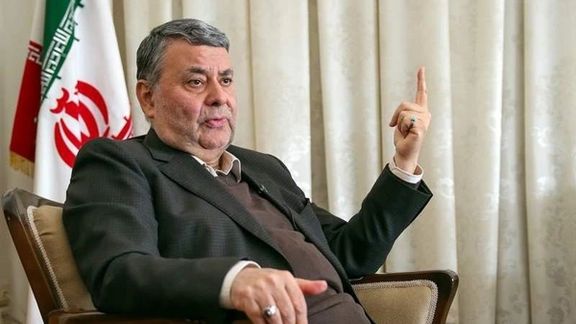
A member of Iran’s Expediency Council says the Islamic Republic does not intend to participate in the Gaza war in spite of funding its proxy Hamas.

A member of Iran’s Expediency Council says the Islamic Republic does not intend to participate in the Gaza war in spite of funding its proxy Hamas.
Mohammad Sadr told the pro-reform Ham-Mihan daily on Thursday that Tehran will only continue to “exert pressure on Israel's supporters to stop the attacks on Gaza," though the Islamic Republic provides training, weaponry and intelligence to its largest Palestinian proxy.
Hamas declared war on Israel on October 7 after its militia invaded Israel by air, land and sea, killing at least 1,400 and taking at least 220 captive.The majority killed were civilians, including women, children and whole families.
The group, designated by the UK, US and EU, began the operation named the 'Al-Aqsa Flood' with a barrage of at least 3,000 rockets as preparation for what would become the single most deadly day for Jews since the Holocaust.
Israel has been hitting Gaza with a continuous flow of airstrikes and is preparing for a ground offensive as it vows to destroy the Iran-backed proxy.
Sadr warned that if a ground incursion takes place, the risk of escalation is higher, demanding a ceasefire, which Israel claims will only be manipulated by Hamas.
"Current initiatives by certain nations and international bodies aim to broker a Gaza ceasefire and compel Israel to halt its actions. Should a ceasefire be achieved without Israeli ground intervention in Gaza, the prospect of the conflict extending to other nations is highly unlikely," he said.
"However, in the event a ceasefire is not reached, and the Israeli military launches a ground incursion into Gaza, persisting in the extensive casualties among Palestinian civilians, the risk of an escalation of the conflict with involvement of other parties becomes more probable."
Iranian proxy Hezbollah in Lebanon continues to target Israel from its northern border while missiles have been fired towards Israel from its proxies in Yemen and Syria already.
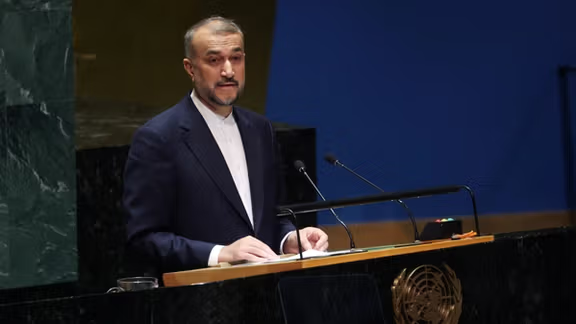
Iran’s foreign minister told the United Nations on Thursday that US forces in the Middle East will not be spared if the Israeli offensive against Hamas continues.
Hossein Amir-Abdollahian reiterated the regime’s warning during an emergency meeting of the UN General Assembly on the Israel-Hamas conflict in New York. "I say frankly to the American statesmen, who are now managing the genocide in Palestine, that we do not welcome the expansion of the war in the region. But if the genocide in Gaza continues, they will not be spared from this fire.”
“It is our home and West Asia is our region, we do not compromise with any party and any side, and we have no reservation when it comes to our homes’ security," he added.
Amir-Abdollahian, who usually speaks in Persian in his diplomatic interactions, delivered the threat in English while in New York, a trip that has invoked strong protests by US lawmakers and activists who have repeatedly urged Washington to deny visas to Iranian officials.
After several minutes of speaking in English, which he spent justifying the brutal Hamas incursion into Israel as a natural reaction to occupation, he switched back to Persian. One of the keywords that Amir-Abdollahian tried to convey in English was "genocide” in reference to Israel’s retaliatory attacks on Gaza after Hamas slaughtered more than 1,400 Israelis and took over 220 as hostages. Palestinian authorities say Israeli air raids have killed more than 7,000 Palestinians, a figure that many such as US President Joe Biden have cast aspersions on.
The regime’s top diplomat said Hamas has told Iran that it was ready to release civilian hostages, adding, "The Islamic Republic of Iran stands ready to play its part in this very important humanitarian endeavor, along with Qatar and Turkey. Naturally, the release of the 6,000 Palestinian prisoners is another necessity and responsibility of the global community." Iranians say on social media that Tehran is a master of prisoner swap deals, and has proved this expertise after it made Washington release billions of dollars of frozen funds as well as five Iranians from US prisons in exchange for five Iranian-Americans held hostage in Iran.
Another salient psychological and linguistic effort by Amir-Abdollahian was aimed at portraying Hamas as a group of “freedom-fighters” or a “liberation army” and not a terrorist group as designated by the US and several other countries.
The regime’s foreign minister referred to Security Council Resolutions No. 309 and 323 ratified 1972 in the case of Namibia, stating that the "inalienable right to self-determination and independence" is permanent and does not disappear over time. “Therefore, just as the prolonged occupation of the land does not create any rights for the occupier, the passage of time does not diminish the right to determine the fate of the occupied nation.” He used this argument as a tactic to conclude that “the Palestinian nation, as a nation under occupation, has the legitimate right to resist the occupation using all available methods, including armed struggle." Therefore, the October 7 attack – codenamed operation al-Aqsa flood by Hamas – should not be described as a terrorist act, he said.
Amir-Abdollahian complained that the US and several European countries have sided with Israel and refer to the Palestinian liberation movement as "terrorists”. He claimed that the US' “unwavering and permanent” support for Israel as “the main cause of the failures of the United Nations, especially the Security Council, in upholding the rights of the Palestinians.”
He did not openly repeat the Iranian regime's call for the destruction of Israel, but said the only solution to the conflict is “through the full realization of the inalienable right of this nation to self-determination and the establishment of an independent Palestinian state in all of the Palestinian territories and with Al-Quds as its capital.”
Emphasizing that “the entire land of Palestine, from the sea to the river, belongs only to the original Palestinians, including Christians, Jews and the Muslims,” Amir-Abdollahian said Iran has “offered a political and democratic initiative which includes the holding of a referendum for self-determination amongst the original residents of Palestine.”

Amir-Abdollahian started his speech with a statement that is globally contested, if not debunked altogether. “The world knows that the Islamic Republic of Iran plays the most constructive role in helping peace and security in West Asia and the whole world as well as fighting terrorism and ISIS,” he claimed despite many labeling Iran as “the biggest state sponsor of terrorism” with a “hostage diplomacy” modus operandi.
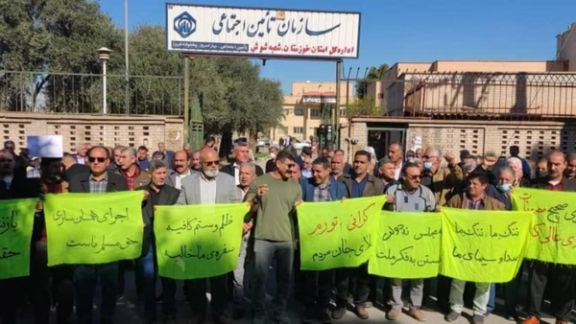
A worsening crisis of insolvency in Iran's social security system and pension funds, poses an additional threat to the unpopular establishment in Iran.
The reports and videos sent to Iran International demonstrate that retirees in different provinces such as the oil-rich Khuzestan, Kermanshah and Kordestan have launched rallies over the recent days to voice their discontent about the government’s economic policies. The protests are expected to continue as pension funds in Iran are experiencing a full-fledged financial crisis.
Shargh newspaper in Tehran provided coverage from a gathering of economic experts who discussed the issue, highlighting the challenges faced by Iran's pension funds, with many receiving no funding at present. The government's debts to Iran's Social Security Organization are steadily increasing, leading to concerns that the government might need to transfer the entire oil industry to the Social Security Organization to settle its debts.
Iran’s pension funds find themselves in an unfavorable situation with many of them receiving zero input at the present, Shargh quoted a former director of Iran’s Social Security Organization Mehdi Karabasian as saying.
Hossein Abdoh, economist and former Secretary General of Tehran Stock Exchange, also pointed out that the Iranian government does not fully comprehend the imminent crisis of the pension funds.

He noted that the government’s debts to Iran’s Social Security Organization are increasing steadily.
“It seems that one day the government will have to give the whole oil industry to the Social Security Organization to settle its debts,” Abdoh warned.
Iran has faced a serious economic crisis since the United States withdrew from the JCPOA nuclear accord in 208 and imposed oil and banking sanctions. Its failure to reach a new agreement under the Biden administration has gradually drained government finances and rounds of serious anti-regime protests have taken place.
Iran’s Social Security Organization is a public institution that provides health insurance, pension and unemployment benefits to its members. They range from workers and government employees to self-employed individuals. According to official statistics, 53 percent of the Iranian population receive some type of benefit from the organization.
On October 24, Moslem Salehi, a member of the Economic Commission of Iran's parliament, said in an interview with Tasnim news agency that all pension funds, “except two or three,” have gone bankrupt.
Without the government’s assistance, these funds will not be able to meet the needs of the retirees, he stipulated. However, the issue is not limited emergency funding, but the underlying factor of a weak economy, mismanagement, corruption, and a huge government budget deficit.
According to Shargh, in the current budget, $6.62 billion of public expenditures has been allocated to pension funds. This is while the government still owes $3.4 billion to the pension funds.
Experts have warned against the policy of funding pension funds via annual budgets, saying that this will result in unfortunate consequences in the future.
In May 2023, the then-director general of social insurance in Iran’s Ministry of Labor, Sajjad Badamforoush said that even if the government sells the two southern islands of Kish and Qeshm and Khuzestan province, it will not be able to pay pensioners' arrears.
He was fired a few days after these remarks.
Earlier in the year, a report in Rouydad24 also pointed out that the crisis concerning the pension funds will paralyze Iran and will plunge its economy into a new crisis in less than two decades.
Touching upon the critical condition of the pension funds, Hossein Amerian, general director of steel industry pension fund, revealed in April 2023 that around $400 million was lost either through mismanagement or embezzlement.
There are 800 investigations taking place to identify all those who are responsible for the losses, he added.
In May 2023, Rahim Mombeini, the deputy head of Iran’s Planning and Budget Organization, announced that President Ebrahim Raisi’s administration faces a huge budget deficit this year.
According to Mombeini, the amount of the Iranian government internal debts has increased about 900-fold over the past decade to $60 billion. This amount of debt, which is equivalent to 31% of the GDP, includes government debts to banks, the Central Bank of Iran, pension and social security funds, public and private sector contractors, and bonds that have been issued in previous years.
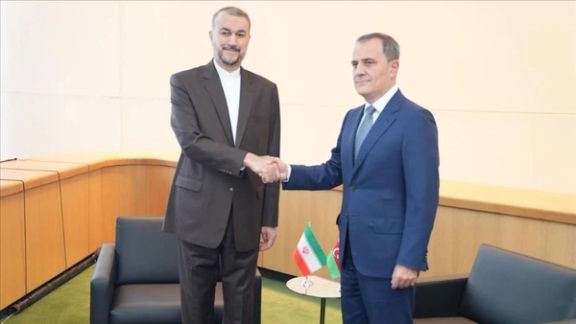
Azerbaijan Republic has redirected its efforts away from seeking a land corridor through Armenia to connect with the Azerbaijani enclave of Nakhichevan.
Instead, the nation is now exploring discussions with its southern neighbor, Iran, as disclosed by a senior Azerbaijani official on Wednesday.
Hikmet Hajiyev, a top foreign policy advisor to President Aliyev, told Reuters that "Azerbaijan had no plans to seize Zangezur," referring to the proposed corridor aimed at connecting mainland Azerbaijan to the Nakhichevan enclave, which shares a border with Turkey, a close ally of Baku.
He explained, "After the two sides failed to agree on its opening, the project has lost its attractiveness for us — we can do this with Iran instead."
Armenia strongly opposed the notion of such a corridor, apprehensive that it might lead to additional territorial concessions following Azerbaijan's swift military campaign resulting in the seizure of the long contested Nagorno-Karabakh region in September.
Although internationally recognized as Azerbaijani territory, Karabakh had been under the control of ethnic Armenians since the dissolution of the Soviet Union in the 1990s, prompting the mass displacement of approximately 120,000 ethnic Armenians into Armenia.
Azerbaijan had recently urged the inclusion of its long-standing request for a transport corridor through southern Armenia in the ongoing peace treaty negotiations.
Iran’s defense ministry earlier warned that it will not tolerate any changes to international borders in the region.
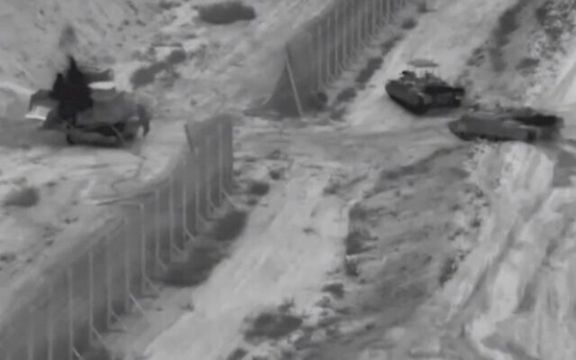
As the US ups the ante against Iran’s possible escalation of the Hamas-Israel war, regime officials renewed threats and dismissed Washington’s warning as “requests.”
During a Wednesday press conference, US President Joe Biden warned Iran against further attacks on US troops in the region after rising incidents in the last week. “My warning to the Ayatollah was that if they continue to move against those troops, we will respond, and he should be prepared,” he warned.
Since Iran-backed Hamas declared war on Israel on October 7, killing more than 1,400 and taking at least 220 hostages back into Gaza, Tehran's other proxy militias have intensified attacks on bases hosting American troops deployed in the region since 9/11. Hezbollah has increased its attacks on Israel’s northern border while proxies in Yemen and Syria have also fired missiles towards Israel.
At least 24 US troops have been injured during 10 drone or rocket attacks on bases in Iraq and three in Syria over the past week.
Biden said his warning to Iran “has nothing to do with Israel,” but it echoes similar statements by Washington that on several occasions warned Tehran to “be careful” not to do anything that leads to expanding the conflict into a larger Middle East war.
The US embassy in Kuwait has also received threats from an Iranian proxy, and downgraded all its operations to those which are deemed essential.
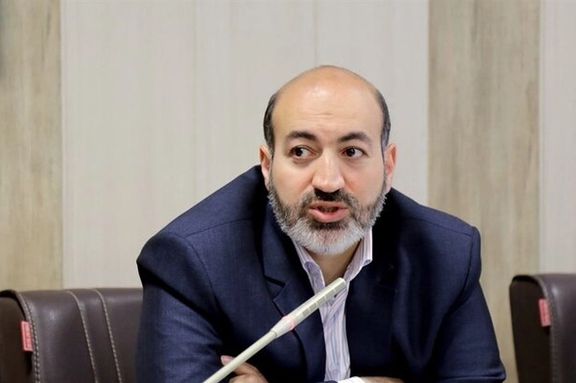
The political deputy in Iran’s presidential office, Mohammad Jamshidi, said in what IRGC-affiliated Tasnim news agency described as a reaction to Biden’s remarks, “The US messages were neither directed to the leader of the Islamic Revolution nor were they anything but requests from the Iranian side. If Biden thinks he has warned Iran, he should ask his team to show him the text of the messages.”
Earlier in the week, Iranian Foreign Minister Hossein Amir-Abdollahian said that the United States sent at least two "urgent messages" to Tehran about the simmering tensions in the Middle East. According to Amwaj Media, a media outlet with links to the regime's close circles, Washington has also communicated a potential shift in its stance regarding Iranian assets held in Qatari banks and postponed talks on nuclear issues. The message was allegedly delivered by Secretary of State Antony Blinken during his visit to Doha on October 13.
In a bid to slam the support given to Israel by the likes of the US and EU leaders, who have given their unequivocal support for its response to an attack which was the single most deadly day for Jews since the Holocaust, Hossein Salami, the Commander-in-Chief of the Revolutionary Guards, said visits by US and European officials to Israel are aimed at “resuscitation to delay the inevitable death of the Zionist regime,” a term it uses for Israel.
Salami also warned against an Israeli ground invasion which the IDF today revealed had begun in small measure with a precise infiltration overnight. He warned, “If they move on the ground, the dragon of Gaza will devour them," suggesting the might of the regime's support will be initiated in full force.
Footage released by the Israel Defense Forces (IDF) Thursday showed forces under the command of the Givati Brigade on Wednesday night carried out a targeted raid using tanks in the northern Gaza Strip, as part of the preparation of the area for the next stages of combat.
As part of the operation, the forces located and attacked many terrorists, destroyed terrorist infrastructures, anti-tank positions and carried out work to organize the area, the IDF said. The troops left the area at the end of the mission.
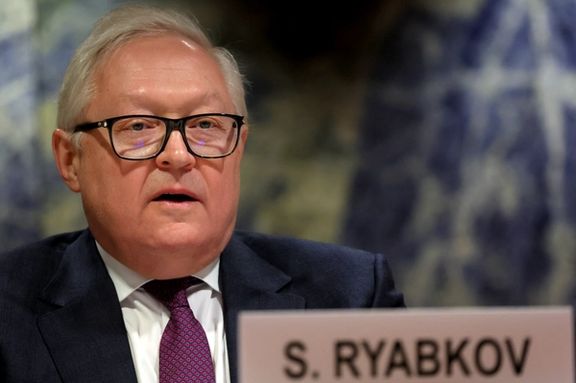
After the end of the UN's sanctions on Iran's missile program, Russia has announced plans to deepen military ties with the regime.
Russia's Deputy Foreign Minister Sergei Ryabkov made the announcement on Wednesday, just days after the October 18 expiration which now allows Iran to sell drones, ballistic missiles, and long-range strike technologies to its anti-Western partners and clients. Ending the sanctions also means Iran can now purchase its own technology to further develop its capabilities.
“We will develop our cooperation on a mutually beneficial basis as we did before - in full compliance with international obligations and existing regimes in this area," Ryabkov said. "Now, after the expiration of some restrictive provisions of resolution 2231, there are fewer such restrictive regimes. Naturally, we will be using this, and it should not raise any questions for anyone.”
Iran, a historical ally of Russia, is accused of supplying lethal drones to Moscow for use in Ukraine, but it has asserted its neutrality in the conflict.
Earlier, the US Treasury Department's Office of Foreign Assets Control took measures in response to the expiration of the UN arms embargo against Iran by imposing sanctions on 11 individuals, eight entities, and one vessel based in Iran, China, Hong Kong, and Venezuela.
These sanctions were applied on the grounds that these entities allegedly supported Iran's Islamic Revolutionary Guard, Ministry of Defense, and Armed Forces Logistics in their efforts related to missile and drone production and proliferation.